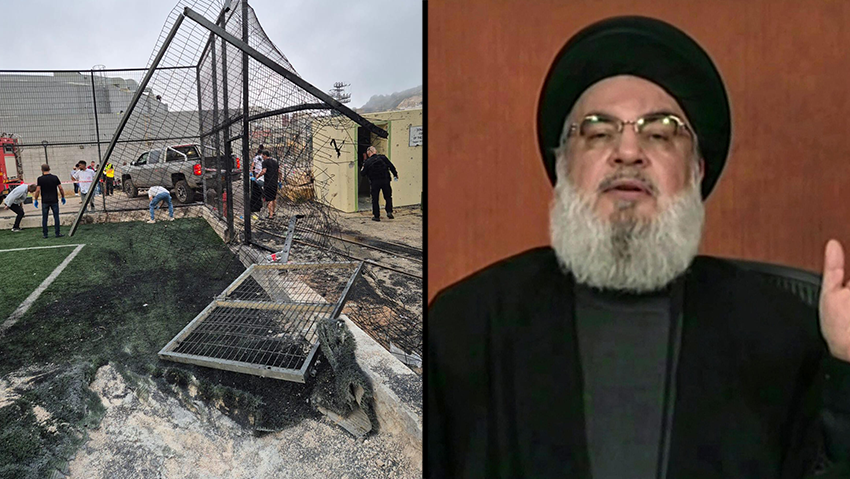Getting your Trinity Audio player ready...
In the shadow of Israel's anticipated response to the massacre of children and teenagers in Majdal Shams, Hezbollah has reportedly begun relocating some of its precision rockets. This was disclosed on Monday by the AP news agency, citing a source within the terrorist organization. The source further stated that Hezbollah's position remains unchanged: The organization does not seek a full-scale war with Israel but will "fight without limitations" if such a conflict arises.
1 View gallery


Nasrallah knows Israel might attack after Majdal Shams strike
(Photo: AFP / HO / AL-MANAR, דובר צה"ל)
An anonymous Hezbollah insider speaking to the AP underscored that the movement of "smart precision missiles" is being executed to ensure the organization can use them if hostilities with Israel intensify. Concurrently, an official Lebanese source told the Saudi television channel Al-Hadath that Lebanon had been notified of an impending Israeli military strike and "requested through intermediaries that the attack be limited and that Israel refrain from targeting Beirut and populated areas."
Al-Hadath added that the source acknowledges the inevitability of the attack but hopes it will pave the way for a return to stability. He was quoted as saying: "The Israeli attack must not cross the rules of engagement." Meanwhile, Iranian President Massoud Pezeshkian, in a conversation with French President Emmanuel Macron, issued a stern warning: "Any Israeli attack on Lebanon will have severe consequences."
A Western diplomat involved in diplomatic efforts to prevent a serious escalation in Lebanon told AP that he anticipates the Israeli response "will not cross the line" to trigger a full-scale war, akin to the attack attributed to Israel in Iran following the extensive drone and missile barrage by the Islamic Republic. "It is clear that Israel wants to assert its stance without sparking a general confrontation," he said. "There will undoubtedly be a response, and it may be symbolic, possibly even spectacular, but it will not be a catalyst for escalation between Israel and Hezbollah."
Rocket hits Majdal Shams
Israel is still awaiting the operational opportunity to carry out the retaliatory strike in Lebanon, which was approved last night by the security cabinet, two days after the massacre that claimed the lives of 12 children and teenagers who were hit by a missile that exploded on a soccer field in Majdal Shams.
The retaliatory attack involves numerous considerations, including the potential presence of non-combatants near the target, the feasibility of hitting senior officials, or striking strategic sites. Alongside these are defense constraints and the completion of preparations. The response options prepared by the IDF were not presented to the cabinet to avoid leaks that could influence the decision.
In Israel, officials indicate that while a few days of fighting are possible, it will still be a "limited operation"– even if it exceeds the scope of what has been seen thus far in the current conflict in Lebanon. Similar sentiments were echoed by Israeli sources to Reuters. "Israel wants to inflict pain on Hezbollah but is not seeking a full-scale regional war," a senior security source told the news agency. "We are preparing for the possibility of a few days of fighting," said two other officials.
Netanyahu said during a visit to Majdal Shams on Monday that "our response will come, and it will be difficult" but the date for the response is still unclear. On Monday evening, senior officials said: "In the cabinet it was agreed that there would be an Israeli response. It is not clear how Hezbollah will respond, it is impossible to know if it will lead to war."
Meanwhile, US National Security Council spokesman John Kirby said Moinday in a press briefing that the predictions of an all-out war on the northern border are "exaggerated." According to him: "We've been hearing this for 10 months. The calls were exaggerated then and are still exaggerated today. Nobody wants a wider war and I'm sure we can avoid such an outcome."
The senior official in the White House repeated the U.S. condemnation of the Hezbollah attack. "We completely condemn the attack in Majdal Shams," said Kirby. "It was carried out by Hezbollah despite their denials. It was their rocket fired from an area they control. We will continue to try to achieve a diplomatic solution along the blue line to ensure the return of Israelis and Lebanese to their homes." Kirby added.
Throughout Monday, the exchange of fire continued on both sides of the border. An Israeli Air Force plane attacked and destroyed a Hezbollah terrorist squad in the area of Meiss El Jabal in southern Lebanon. In the morning, three Lebanese civilians were injured in an Israeli artillery attack on a house in Shebaa. Hezbollah announced two of its operatives were killed, but did not say under what circumstances. At the same time, the Israeli Navy intercepted a UAV that made its way toward a gas rig in the Mediterranean Sea. The IDF spokesman said that the interception was carried out by the Navy's Sa'ar 6-class corvette in cooperation with the Israeli Air Force after a UAV that left Lebanon was detected in Israel's economic waters. On Monday evening, about 20 missiles were detected that crossed Lebanese territory and fell in an open area near the Goma junction in the Upper Galilee.
First published: 20:47, 07.29.24




